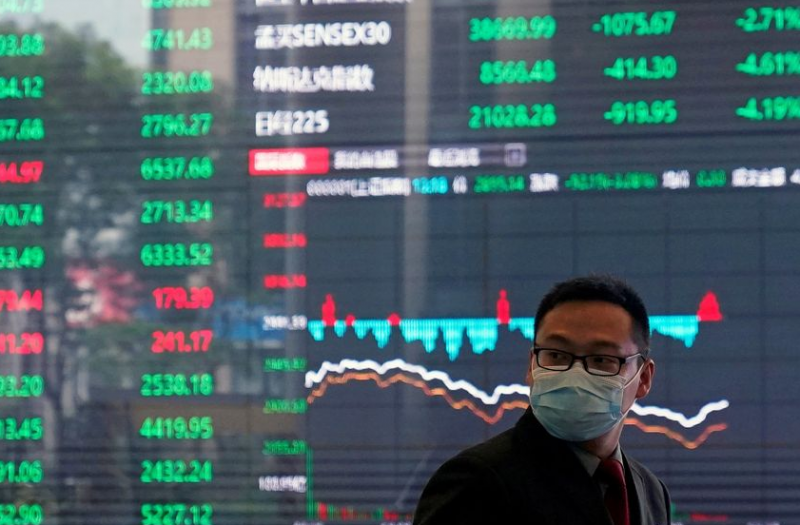
BEIJING: Shares tumbled across Asia on Wednesday, with Hong Kong's benchmark falling more than 2% despite Beijing announcing it would significantly ease its "zero-COVID" policies and efforts to isolate individual cases. will shut down
The Shanghai Composite index was down 0.4% at 3,199.62 and the Hang Seng index in Hong Kong was down 2.5% at 18,949.24.
With the exception of vulnerable sectors such as nurseries, senior care facilities and schools, the National Health Commission's announcement ended the need for COVID-19 tests and health bills to be displayed on smartphone apps in most places. Additionally, it limited the scope of the lockdown to specific apartment floors and buildings as opposed to neighborhoods and entire districts.
Also Read: Markets turned volatile after RBI hiked repo rate by 35 bps
While experts predict it may not be at least until mid-2023 before restrictions on trade, industry and travel are completely lifted, global stock markets have rallied on hopes of significant changes that will restore the global economy to the level it was before the pandemic. Can help get back in position. "General."
The Kospi fell 0.4% to 2,382.81 in Seoul while the Nikkei 225 index fell 0.7% to 27,686.40 in Tokyo. In Australia, the S&P/ASX 200 fell 0.9% to 7,229.40, while the Shanghai Composite fell 0.4% to 3,199.62.
Shares also declined in Bangkok and Mumbai.
In November, China reported that both its imports and exports contracted as domestic demand and anti-virus measures put pressure on the world's second-largest economy.
According to customs data, exports fell 9% from a year earlier, worsening from October's 0.9% decline. Imports declined by 10.9% this month, after a 0.7% decline the month before. In the wake of interest rate hikes by the Federal Reserve and central banks in Europe and Asia to curb rising inflation, sugar trade was expected to weaken as global demand slumped.
Also Read:RBI MPC Live Updates: Repo rate hiked by 35 bps
On Tuesday, the tech-heavy Nasdaq fell 2% to 11,014.89 and the S&P 500 fell 1.4% to 3,941.26, its fourth straight loss.
The Russell 2000 fell 1.5% to 1,812.58 while the Dow Jones Industrial Average fell 1% to 33,596.34.
Some of the biggest losers were retailers, communications companies and technology stocks. Disney dropped 3.8%, Apple dropped 2.5%, and AutoZone dropped 2.8%.
Small-company stocks also declined, leading the Russell 2000 index to lose 1.5%. After posting two consecutive weeks of gains, the major indices are expected to register weekly losses.
Stocks declined on Monday as concerns that the Fed still has work to do to get inflation under control increased in response to stronger-than-expected economic readings. The Fed accomplishes this by intentionally slowing down the economy by raising interest rates.
To better understand how the economy is coping with persistently high inflation, investors are closely monitoring economic data and company announcements. Additionally, they are trying to reduce the rate of inflation.
The Federal Reserve is expected to raise interest rates by half a point at its meeting next week. Since March, it has raised its benchmark rate six times, bringing it to a range of 3.75% to 4%, the highest in fifteen years. By mid-2023, Wall Street expects the benchmark rate to reach a peak range of 5% to 5.25%.
An update on weekly unemployment claims will be provided to Wall Street on Thursday. One of the stronger sectors of the economy has been the job market.
The government's report on producer prices for November will be made public on Friday. As a result, investors will gain a better understanding of the impact of inflation on businesses.
Also Read: Asian shares decline as positive data dampen expectations for a dove Fed
The University of Michigan's December Consumer Sentiment Survey will be made public on Friday.
In other trading on Wednesday, US benchmark crude rose 1 per cent to $74.26 a barrel in New York Mercantile Exchange electronic trading.
Brent crude oil, which serves as the international benchmark, rose 16 cents to $79.51 a barrel.
The dollar rose to 137.55 Japanese yen from 136.94. The euro fell from $1.0468 to $1.0457.